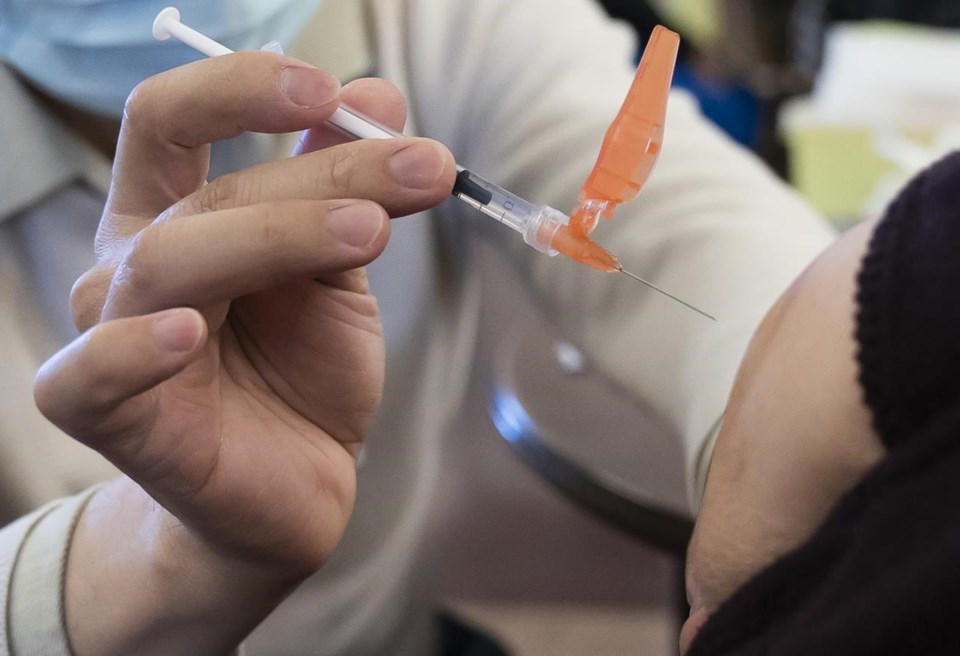VANCOUVER — British Columbia's top doctor says she hopes the COVID-19 vaccine card system that came into effect Monday could support the loosening of some pandemic-related restrictions, including indoor capacity limits, in the coming weeks.
The system means additional restrictions in the Interior Health region, such as limits on gatherings, are being revised to allow for exemptions in places where proof of vaccination is required, provincial health officer Dr. Bonnie Henry said.
In place until at least Jan. 31, the card is a tool to help protect as many people as possible from COVID-19 "so we can get as much open as possible and get back to doing the things that we need and love," Henry told a news conference on Monday.
Anyone who wants access to a range of non-essential indoor services must show proof of at least one dose of a vaccine, with a second shot required by Oct. 24. The digital or paper vaccine card is required at settings like ticketed sports events, concerts, restaurants, bars, nightclubs, casinos, gyms and movie theatres.
The card is not required at grocery and liquor stores, pharmacies, fast food restaurants, salons, hotels, banks, retail stores, food banks and shelters.
The response among members of the Surrey Board of Trade has mostly been positive, CEO Anita Huberman said, though a handful of businesses have said they would not follow Henry's order to check for proof of immunization.
Some claim they don't have the resources to implement the system, seeing it as yet another rule imposed by the provincial government after 18 difficult months of restrictions aimed at curbing the spread of COVID-19, Huberman said.
"It's a new process and yes, it's one added layer that a business has to engage in, but necessary so that businesses don't shut down," she said in an interview.
Meanwhile, Huberman said the operator of a live music venue in White Rock recently told her that 20 per cent of people who had bought tickets for an upcoming show had cancelled because they didn't want to show their vaccination status.
The vaccine card has spurred protests, including outside hospitals in B.C.
Henry said she recognizes some people find the vaccine card "difficult," but she's disheartened they find it's OK to take out their frustration on health workers.
"Our health-care workers across B.C. are day in and day out providing the care we need in sometimes extremely stressful situations, and they continue to care for people, no matter what their vaccination status is."
B.C.'s emergency departments and intensive care units are strained with the added burden of COVID-19 patients, she said, most of whom haven't been vaccinated.
While some in the business community have expressed concern that would-be patrons who are upset about the vaccine card could threaten the safety of staff, Premier John Horgan has told businesses to call law enforcement if necessary.
A provincial guide to the vaccine card for businesses shows fines can range from $230 to $575 for individuals, depending on the violation, while event organizers, owners and operators could be fined $2,300 for failure to comply with the system.
Asked about threats businesses have received from those who oppose the vaccine card, Henry said they have no choice but to require it.
"It really stuns and saddens me to think that people would find that an acceptable way to express their frustrations over something as important as trying to keep people employed, trying to keep businesses open, trying to keep people safe," she said.
"These are the businesses that have suffered the most through this pandemic and the people who work there are deserving of respect."
Health Minister Adrian Dix said the vaccine card provides people with opportunities to gather and participate in activities that have been restricted throughout the pandemic and threatening others for following the law is "despicable."
Nearly 86 per cent of eligible residents in B.C. over the age of 12 have received their first dose of COVID-19 vaccine, while 78.4 per cent have received both shots.
Ontario, Quebec and Manitoba have also introduced vaccine passport programs.
Showing proof of vaccination is not required to vote in the Sept. 20 federal election.
This report by The Canadian Press was first published Sept. 13, 2021.
Brenna Owen, The Canadian Press



